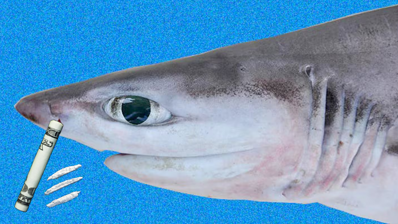Cocaine fuelled sharks are now swimming in Brazil...
- Publish date
- Tuesday, 23 Jul 2024, 1:35PM

This was published by nzherald.co.nz
Cocaine has been found in sharks off the coast of Brazil and may be changing their behaviour, scientists fear.
Marine biologists tested 13 Atlantic sharpnose sharks taken from coastal waters near Rio de Janeiro and found they all had high levels of cocaine in their muscles and livers.
In a paper for the journal Science of the Total Environment, they said the drug probably originated in drainage from illicit labs where cocaine is manufactured, or from the excrement of drug users, via untreated sewage.
It might even have come from the sharks feeding on bales of cocaine lost or dumped overboard by drug smugglers – but that was less likely, the team said.
The results showed “chronic exposure due to human use of cocaine in Rio de Janeiro and the discharge of human urine and faeces by sewage outfalls, as well as from illegal labs”, said Dr Rachel Ann Hauser-Davis, a British scientist and member of the research team from the Oswaldo Cruz Foundation in Rio.
“We don’t usually see many bales of coke dumped or lost at sea here, unlike in Mexico and Florida,” she told the Telegraph, meaning it was unlikely the sharks had been eating discarded packages.
The cocaine was probably harmful to the health of the animals, she said. It was not known if it affected their behaviour, rendering them more aggressive and unpredictable or making feeding frenzies more likely.
“This may be the case, as cocaine targets the brain, and hyperactive and erratic behaviour has been noted in other animals. It’s a possibility and further studies are required,” said Dr Enrico Mendes Saggioro, an ecotoxicologist from the Oswaldo Cruz Institute.
One way cocaine may damage sharks’ health is by impacting their eyesight, affecting their capacity to hunt.
“You might start to see lower fecundity and growth rates,” Dr Tracy Fanara, an expert in ecotoxicology and environmental engineering from the University of Florida, told the Telegraph.
She agreed that there was no evidence, as yet, to suggest that cocaine encouraged crazed behaviour or feeding frenzies in sharks.
“They may not be going nuts from the cocaine but it could reduce their life expectancy,” Fanara said. She took part in the Discovery Channel film Cocaine Sharks, which explored whether sharks in the Gulf of Mexico were feeding on cocaine packages dumped by traffickers.
Fanara added: “This is representative of problems all over the world, whether it involves cocaine or fertiliser or herbicides.
“We are releasing these chemicals into the environment and the question is, how are we affecting the ecosystem?
Take your Radio, Podcasts and Music with you

